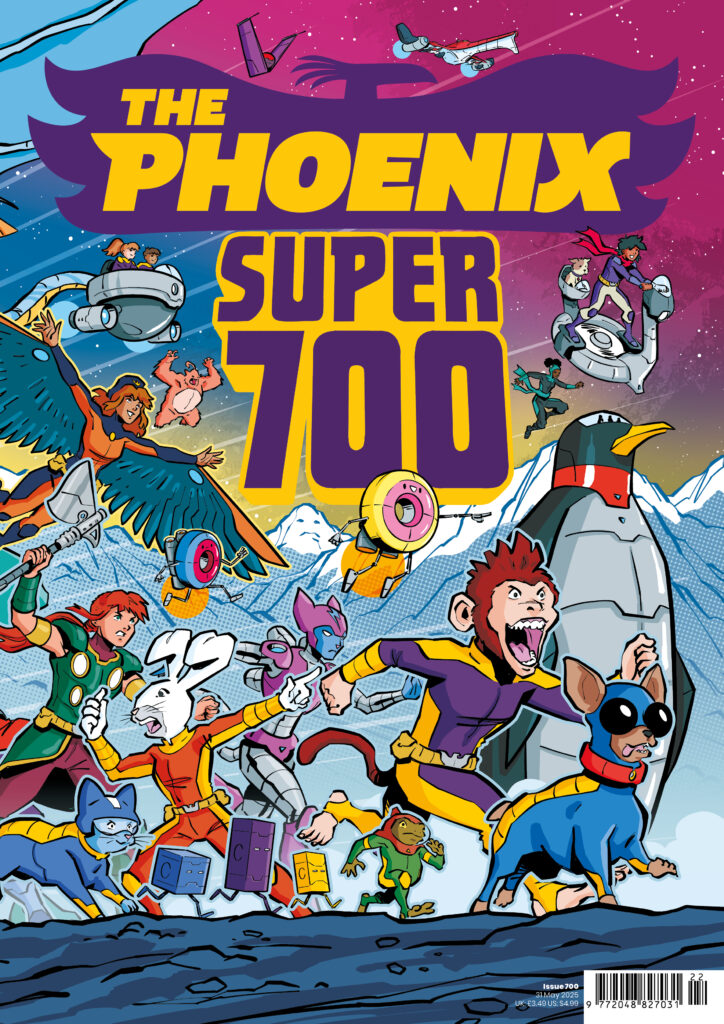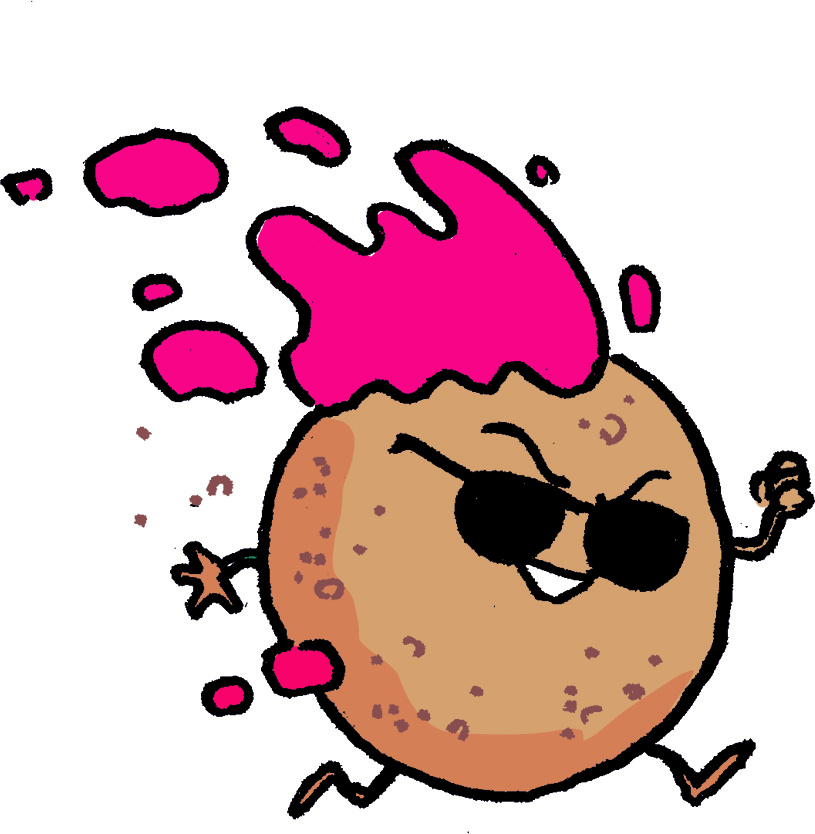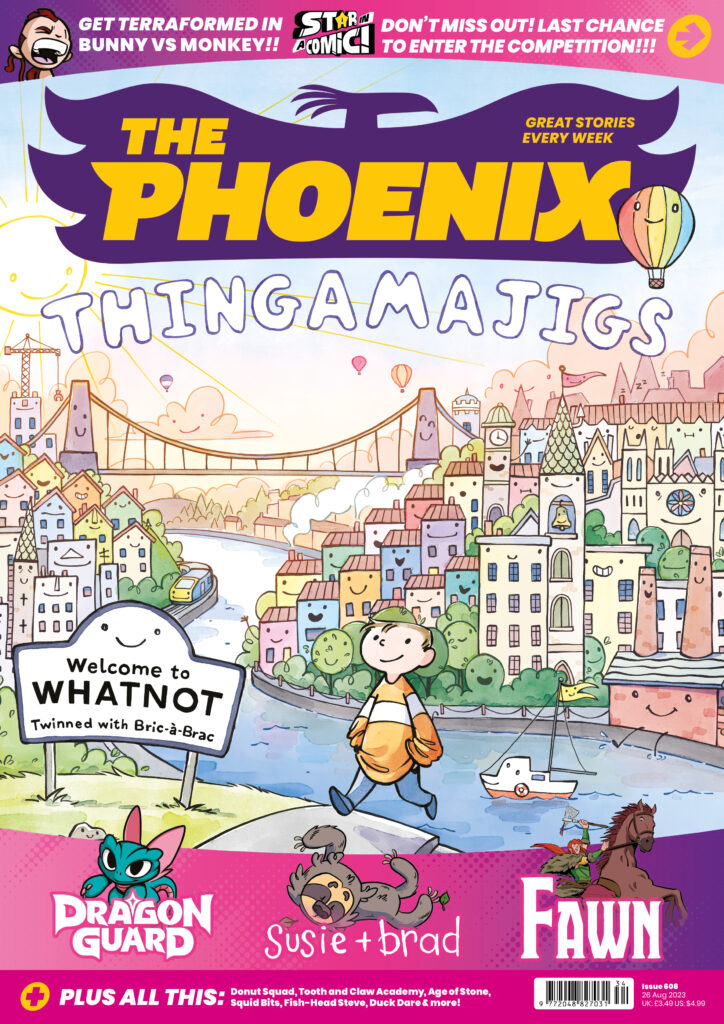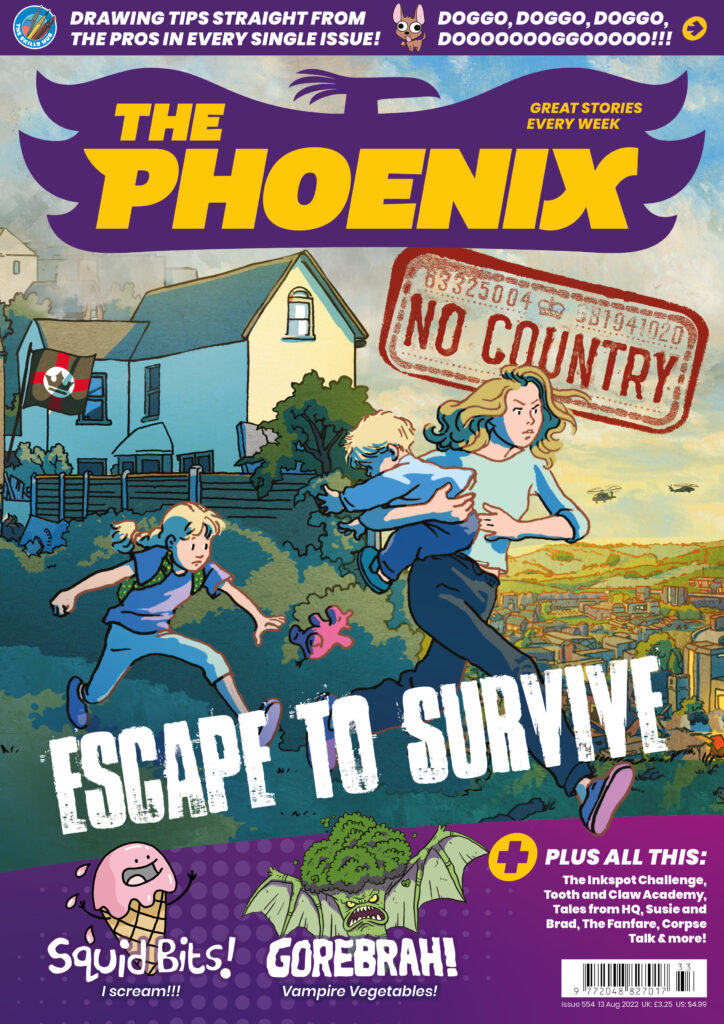The Phoenix recently celebrated its 700th issue – a monumental milestone for the weekly comic that has become a beacon of creativity, rebellion, and joy in children’s publishing.
Born from the ashes of The DFC and launched in 2012, The Phoenix was built on a commitment to storytelling for children without commercial tie-ins. Its success, the team agrees, lies in its weekly print format, its celebration of creators, and its imaginative storytelling that invites kids to become lifelong readers — and, in some cases, future contributors.
Doing things differently
Since its launch, The Phoenix has dared to do things differently. As Deputy Editor Joe Brady puts it, “We’re not here to please ourselves – we’re here to excite kids. If the answer to ‘Will children love this?’ is yes, we do it. If it’s no, we don’t.”
That reader-first mindset – along with unshakable support for artists and writers – has made The Phoenix both an incubator for talent and a trailblazer for the future of British comics.

The Phoenix has revived something once central to British comics: the weekly anthology format. As creator Neill Cameron notes, this offers unparalleled variety and accessibility. “If it can appeal to lots of different readers, they will all have their own favorites.” The diversity helps every child find something that resonates, while the weekly cliffhangers build lasting reading habits.
Crucially, The Phoenix has transformed how British comics treat their creators. Where the industry once treated writers and artists as uncredited, interchangeable workers, The Phoenix makes creators the stars.
“The fact that The Phoenix celebrates and shouts about its creators means that kids immediately get that,” says Cameron. Children now “hero worship” creators like Jamie Smart, dreaming of comics careers themselves.



The comic’s 700-issue journey — continuing weekly even through COVID-19 without missing a deadline — shows the resilience of independent publishing. Cameron, who nearly left comics due to unfulfilling commercial work, says The Phoenix saved his career and gave him the chance to create meaningful stories like Mega Robo Bros and Donut Squad.
where it all began
The story began with David Fickling, a veteran children’s publisher behind three of The Times’ top children’s books of the last 30 years. A lifelong comic fan, he saw a truth others ignored: children love comics.
His son Tom Fickling, now Managing Director and Editor-in-Chief, explains:
“Comics had been so successful in other parts of the world, manga is an amazing export of Japan. Marvel, DC have kind of informed seismically the entirety of modern cinema.”
“For an industry to be successful, it needs to be commercially successful… you need to make things that people want to read.” That doesn’t mean compromising integrity — it means understanding your audience and creating welcoming spaces for families.


a home to innovation
The magazine’s model of weekly testing, long-term creator partnerships, and developing strips into books offers a sustainable path for publishing. It’s a reminder that creative industries flourish when allowed to take risks and evolve.
Innovation has always been essential to The Phoenix. In a shifting media landscape, staying relevant means more than great content — it takes bold thinking. Whether experimenting with formats or reinventing how stories reach young readers, the comic has constantly adapted to ensure its survival.
“We knew we had amazing material… but the real step change was providing it to bookshops in a format they could easily sell. That unlocked everything.”
Anthony Hinton, Senior Commissioning Editor.
From the beginning, The Phoenix has reimagined how stories are delivered. Traditional A4 comic formats didn’t always work on bookshelves — so the team took the bold decision to reformat for retail. “It felt like there was a real opportunity,” explains Hinton. “We knew the readers were excited – we just needed to meet them where they were.” The result: a thriving publishing imprint that transformed titles like Bunny vs Monkey and Donut Squad into international successes.
The Phoenix has fostered a unique publishing model where the weekly comic serves as a vital foundation for its book imprint, published by David Fickling Books. This approach supports the experimentation and refinement of ideas before they are developed into popular book series. Looking ahead, the team is focused on expanding their comic book imprint, adapting more Phoenix stories into books, and embedding the comic into UK culture for the long term, championing quality storytelling. As Tom Fickling states, “It’s a long-term generational game, like the Beano, and we’re looking to play for a thousand issues.”
driving the industry forward
And now the Phoenix is a workplace for some of it’s first readers. For Ned Page, The Phoenix is more than a workplace – it’s where his love of reading and storytelling began. As a dyslexic nine-year-old, he discovered Pirates of Pangaea and Bunny vs Monkey, which sparked his confidence as a reader. Now, he writes for Doggo and helps run live digital events connecting readers with artists. “The Phoenix was my gateway into reading,” he says. “Jamie Smart kind of speaks for himself — and now we’ve sold two million books. It’s only going to grow.”
Grace Christer’s journey shows that comics flourish not only through artists and writers, but also because of the people behind the scenes — in marketing, logistics, and customer service. “I’m not an artist myself, but I love comics. I still get to be involved and have input into the comic. There are so many roles behind the scenes — it’s not just the writers and illustrators who make it happen.”



building a strong future
As The Phoenix celebrates 700 issues, it underscores the need for greater support of British comics from Government. These aren’t just stories, they’re cultural artefacts that build literacy, fuel imagination, and create multiple careers. The comic’s evolution from a passion project to 700 issues of excellence shows what’s possible when we invest in creative independence.
The Phoenix represents more than a comic — it’s proof of what British creativity can achieve when it’s properly nurtured.
Seven hundred issues down, countless more to come — The Phoenix continues to soar.
Explore the phoenix and the amazing stories, artists and writers who are driving British creativity forward.



